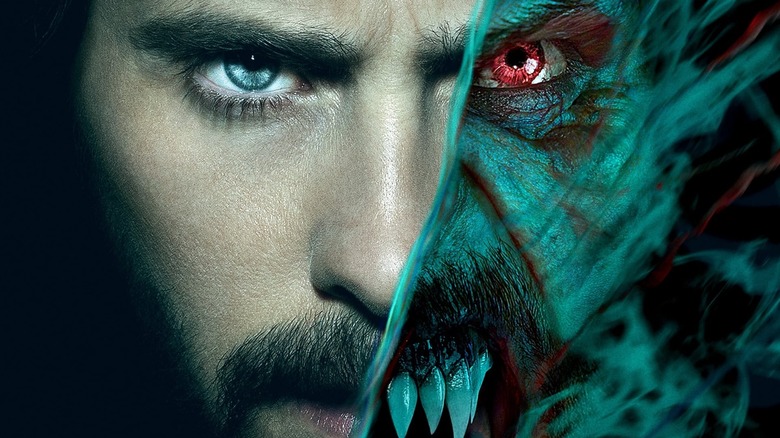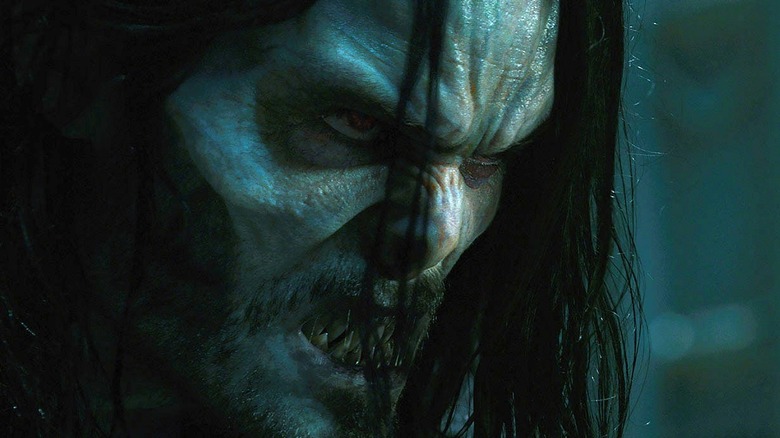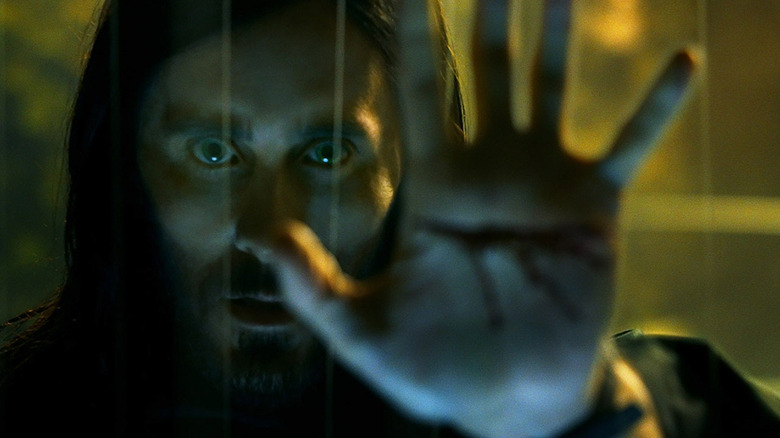Morbius Review: Beware The Bat, Man
As you're watching "Morbius," you can already see it vanishing into the dollar bin of video stores long forgotten. It's one of those films like "Jonah Hex" or "The Phantom," something pop culture will occasionally reference in ten or 20 years and we'll all think "Oh, that's right. They made a movie out of that!" But as destined as it seems to be set aside, sneered at and — even worse — unsequelized, this is also the sort of film you might catch late one night in a decade or two and realize it isn't as bad as everyone remembers.
A Marvel film far more interested in supernatural horror than superheroes, the flick directed by Daniel Espinosa ("Safe House") was delayed multiple times and limps into theaters bearing all the scars of something that has been edited, re-edited, and re-edited again to suit different agendas. Plotlines vanish, major details unfold with minimal explanation, and — this being a post-"No Way Home" film centered on a Marvel character — minimal, vague references to Venom, Spider-Man and the multiverse feel mandatory rather than organic. The third act sneaks up on you like a thief in the night, leading to an "epic showdown" that feels like the fourth or fifth best fight in most Marvel films.
Which is a shame, because there are some very interesting elements afoot in this depiction of Dr. Michael Morbius (Jared Leto). After a spooky opening in a cave filled with vampire bats, we flash back 25 years prior to meet the future "living vampire" as a child, dependent on regular blood transfusions to stay alive. He is cared for by Emil Nikols (Jared Harris) and becomes friends with a fellow patient he dubs Milo (Matt Smith); the two young men pledge to do whatever they can to cure their ailments — and Morbius is smart enough to get to the verge of doing exactly that as an adult, engaging in advancements and experiments that could finally bring them health.
But while Morbius will make it clear later in the film that words like "vampires" and "Dracula" are within the realm of his awareness, he clearly hasn't learned any lessons from such stories. Long after every member of the audience will wholeheartedly conclude that his experiments are ill-advised and likely to have monstrous results, he's still injecting bat DNA into himself — and guess what? It turns him into a monster.
Fangs for the memories
Thankfully, the Marvel elements of the film elevate it above your standard vampire flick. Setting aside franchises like the "Blade" and "Twilight" films and small outliers like "Let the Right One In," most cinematic vampiric tales of the past couple decades have been uninspired public domain duds, from "Dracula 2000" to "Abraham Lincoln: Vampire Hunter" to "Daybreakers" and "John Carpenter's Vampires." As presented in this film, Morbius is a character who "invents" vampirism to save his life, one who opens a Pandora's box and then is forced to deal with its consequences, desperately sucking down bags of artificial blood to keep his hunger at bay, but smart enough to know he can't keep it up. Say what you will about "Morbius," but at least its origins — a Marvel character first published in 1971 with 50 years of storylines — gives this particular vampire some depth.
Every comic book film needs a villain, and although Morbius is about as anti-hero as a hero can get, he does (try to) not kill people and he does (try to) not turn others into vampires. This is not the case for Milo, who follows his friend down the vampirism path and then laps him, viewing his new reality as a long-overdue reward, embracing newfound health and athleticism, drinking deeply from the necks of anyone he deems his next dinner. The Milo character is horribly underwritten — what is his motivation, really, other than to simply be his best self? — but Smith injects madcap fun when the dialogue runs out. Half the time he's onscreen, it seems he's doing some sort of gleeful dance.
Leto, meanwhile, can't seem to decide if his character is supposed to be morose or mischievous. It likely isn't his fault ("Morbius" feels like it was edited rather than directed), even if he is credited as an executive producer on the film. In some moments, he mopes so much that even the angsty, rain-soaked Pacific Northwest vampires of "Twilight" would tell him to lighten up; out of nowhere, he'll jokingly pretend to be burned by sunlight, teasing that he's "not that kind of vampire." This movie could have used more of that levity, but instead feels like a straight-faced "Doctor Strange," bogged down in mystical mumbo-jumbo without the release of the occasional wi-fi joke.
Visually, the film also has its hits and misses. More than any recent blockbuster, "Morbius" suffers from that horrible trend where action scenes are shot so close up that you can't tell what's going on for long stretches of time; there's a scene where the character is tumbling through the air, and the viewer is rendered completely unmoored. On the other hand, a nifty "swirl" encompasses the vampires when they use their powers (a visualization, it seems, of their sound waves), frequently giving them the look of painted pictures rather than human beings. With all the comic book-fueled media we're seeing these days, such flourishes of uniqueness are appreciated.
Withdrawing from the blood bank
But most cripplingly, this is a film that does a miserable job hiding its strings. When an inconsequential character enters a room during a seemingly quiet moment, carrying a machine gun and spitting out a sexist comment, clearly something is about to attack and kill him. When our villain needs a way to "hurt" Morbius without actually killing him, how convenient that he gets a front row seat for our hero's unearned, out-of-left-field kiss with fellow researcher Martine (Adria Arjona) — immediately marking her as a damsel ripe for distress. Two FBI agents investigating the rapidly-increasing stack of blood-drained bodies (Tyrese Gibson and Al Madrigal) are a threat when needed, then vanish for long stretches of time. A big deal is made out of Morbius' echolocation, but he rarely uses it; he'll suddenly control bats like Aquaman controlling fish, but we're never told why.
The sloppiest element of "Morbius," however, has to be the one people are most likely to buy a ticket to see: the post-credit sequences. There are two of them, both equally confused, and both feeling as if the actors either weren't in the same room or serious ADR was used to change their meaning. Without going into spoilers, suffice it to say that you'll know even less about the future of whatever universe this is than you had when you came in.
When all is said and done, "Morbius" feels like a missed opportunity. Leto, like Heath Ledger with the Joker and Robert Downey Jr. with Iron Man, brings a charm and swagger to the character that is hard to deny. The film's supernatural elements are a refreshing twist on the Marvel movie formula, and there's a dark, goofy "Venom"-like charm inherent in this material. Those three elements feel like they could be better served in movies focused on different characters; like Hulk in the MCU, perhaps Morbius needs to be a side dish that adds to the meal, rather than the main course.
Is "Morbius" a good vampire film? Actually, yes. But as a Marvel movie, it feels akin to Jennifer Garner's "Elektra" — a disposable could-have-been, destined to be quickly forgotten. Here's hoping Leto's Morbius makes like a vampire and someday rises from the dead, because seeing him sharing scenes with Tom Hardy's Venom, Tom Holland's Spider-Man or (especially) Mahershala Ali's Blade could be a lot more fun than this lackluster dud of a debut.


